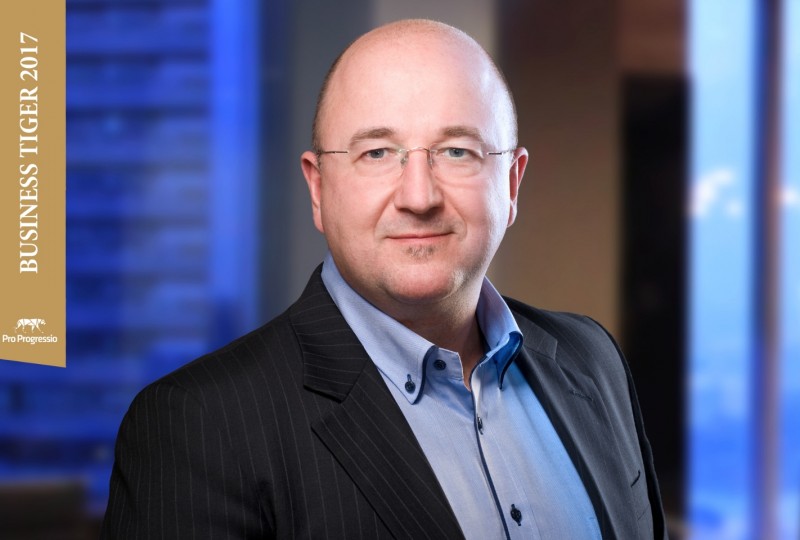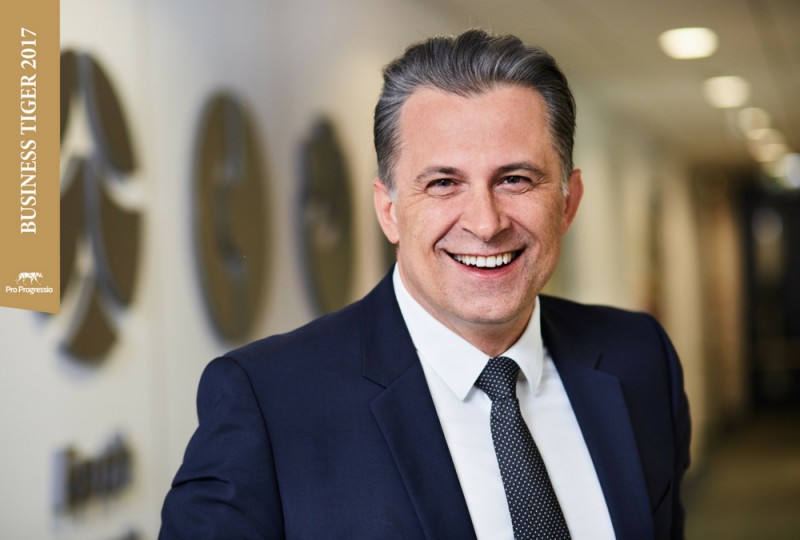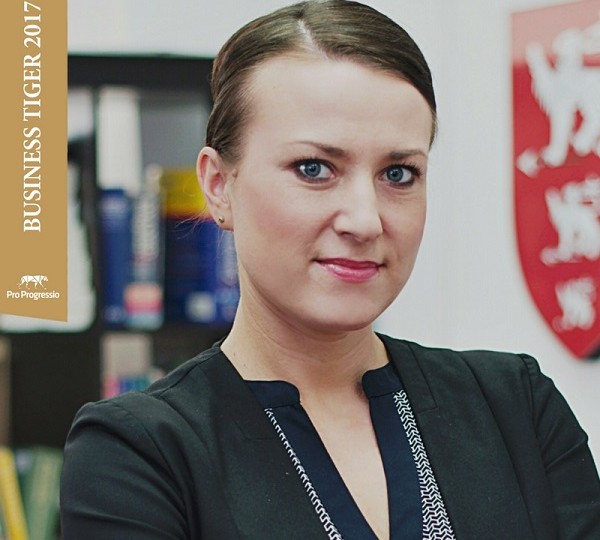Tomorrow’s HR industry – how it will look like? – interview with Piotr Dziedzic Business Tiger 2017.
Senior Director at Michael Page, in charge of Production and Supply Chain, Real Estate and Construction, Shared Services Centres, and Sales and Marketing. He also supervises global Regional Operational Programmes, and key clients. He boasts 12 years of professional experience in recruitment and HR consulting, including almost 10 years of service at PageGroup. He has successfully completed over 500 projects. Member of the Board of the Polish HR Forum – Piotr Dziedzic, Director – Michael Page, Business Tiger 2017.
Kamila Czyżyk, Pro Progressio: According to Michael Page surveys (Confidence Index 2018), 79% of Poles believe the current situation in the labour market is good. As experts in recruitment, you are a link between the employee and the employer. We already know what employees think. What is the situation like on the employer’s end?
 Piotr Dziedzic, Michael Page: Based on my own experience, I can say that nowadays employers are looking at the market from two perspectives: on the one hand, lower unemployment implies more intense consumption and better economic indicators, which means a potentially more numerous group of clients, and this, in turn, means higher demand for their products; on the other hand, a low unemployment rate implies fewer candidates in the labour market, and all the consequent difficulties related to the acquisition of new staff needed to respond to an increased demand.
Piotr Dziedzic, Michael Page: Based on my own experience, I can say that nowadays employers are looking at the market from two perspectives: on the one hand, lower unemployment implies more intense consumption and better economic indicators, which means a potentially more numerous group of clients, and this, in turn, means higher demand for their products; on the other hand, a low unemployment rate implies fewer candidates in the labour market, and all the consequent difficulties related to the acquisition of new staff needed to respond to an increased demand.
Just a few years ago, when Poland’s unemployment rate oscillated around 20 percent, the major challenge for HR departments was to pick the best talent from hundreds of CVs. Now, given the unprecedently low jobless rate, businesses begin to feel a shortage of candidates – both in lower specialist positions, and in managerial positions and director jobs. The deficit of candidates at higher levels results from the fact that employees are less inclined to change jobs. This is a clear consequence of the fact that they find the terms of their employment fully satisfying. All this has an impact on the HR policy, as it can imply bigger difficulties to acquire and attract valuable people to a company. High employee turnover in lower positions is, above all, the result of low pay, although a change in employers’ approach can be seen in this area too.
Recently, in order to stop the revolving door of employee turnover, many businesses have revised their remuneration policy, increased pay levels and launched additional benefits, such as sports cards, or private insurance. Businesses have also started to run employer branding activities more and more intensively, using a variety of tools – not just a job offer itself, but also its values, or organisational culture.
Currently, one of the things which employers rely on heavily is to start long-term cooperation with their employee. It turns out that a majority of businesses believe that whilst it is possible to transfer technical or process knowledge to their staff, the acquisition of soft skills, such as proper communication, or fitting to the organisational culture, is a lot harder. And, to a large extent, it is this factor that decides whether an employee will want to stay in a given company, or quit.
As far as specific fields of the market are concerned, shortages of staff are a major concern in the IT sector, where demand for specialists – especially cybersecurity, Blockchain, or cloud experts – is high. This trend has been around for a few years, and for the moment, it looks like it is here to stay. The growing demand for candidates can also be seen in sales, where employee turnover, especially in lower positions, is very high. The area in bad need of workers is also TSL. According to estimates, there is a shortage of about 100,000 drivers in Poland alone. Another area that is struggling with shortages of staff is commerce: estimates of UNI Europa Global Union and EuroCommerce reveal that Poland is suffering from a deficit of about 100,000 people able to handle shops and other retail outlets. The manufacturing sector is also facing up to a lack of specialists, alongside the industrial and power generation sectors, where the shortages of qualified workers, as estimated, may exceed 20 percent.
It is clear to see that the situation in the labour market is pretty dynamic, and the two sides – both the employees and the employers – are looking for new solutions to reach out to the recruitment processes that interest them. Could you say a few words about SMAC?
The new trend within HR that is derived from the synergy of four technologies – Social, Mobile, Analytics, and Cloud, and commonly known in the abbreviated from SMAC – aims to enhance the competitiveness of businesses in the job market. It allows to maximise the chances of getting through to candidates, get to know both the potential and current employees better, and at the same time keep the costs down to a minimum. The philosophy of SMAC is to facilitate fluent and coherent cooperation of the four technologies, each of which is equally important. SMAC alters the way in which staff-related decisions are made and automates selected processes, whereas cognitive technologies allow to assign part of the tasks to systems based on appropriate algorithms. A case in point are chatbots – solutions that are applied with success by more and more businesses.
According to the data revealed in a Deloitte report, 74% of Polish businesses find HR digitisation a major element of their corporate structure. SMAC-based actions will soon be part of everyday life for employers and candidates across Europe. Thanks to the implementation of this smart approach, Poland has the chance of trailblazing the HR revolution that is taking place on our continent. This means that HR departments need to get ready to run their recruitment activities in a non-standard way.

What do you think are the trends – beyond SMAC – that currently play first fiddle in HR?
I think what is playing an increasingly important role in recruitment are mobile and social programs that stimulate involvement and foster the sense of belonging to an organisation. One of the platforms that has a lot to offer in this area is LinkedIn, which gives you some hints as to which candidates might meet the employer’s requirements. Video-recruitment is also gaining momentum, and in the future, we can assume that arranging to meet with a candidate for video conversations will become a routine. Apart from using social media and technological tools, one must not neglect the growing significance of employer branding. These days, businesses pay a lot more attention to how they are perceived by their employees and candidates, which explains why they invest more and more energy and resources in various schemes that help them to attract and retain talent.
As revealed by the Confidence Index survey, nowadays financial issues may not be a sufficient motivating factor pushing people to change jobs. This means that HR staff and employers will have to face a new challenge: by aptly operating a variety of non-financial factors, they will have to encourage candidates to quit their current jobs. One of the key roles here is played by the atmosphere in a company, relations with peers and superiors, or the chances of keeping a healthy work-life balance.
The Business Tiger award is given to people who have a major impact on the sector of modern services for the world of business. This often goes hand in hand with the experience gained and the challenges that one had to overcome to find themselves where they are now. Do you remember a situation which had a major impact on your career in HR?
I am really honoured to receive the Business Tiger award, and I am so very grateful for it. I know from my own experience that our career path can be enhanced by a dynamically growing organisation, and I was lucky enough to find myself in one. What also matters a lot in your professional endeavours are the people you cooperate with. One of the greatest challenges was the creation of my team, and the recruitment process aimed at picking the candidates to work in it. It obviously translated into all the later successes – both the individual achievements of each of us and our attainments as a team. As a result, I’m still working with some people I’ve been working with since I joined PageGroup, which is nearly a decade. What has also played a key role in my professional life was joining the Polish HR Forum, and becoming member of its Board at a later stage. This has allowed me to expand my knowledge and experience, and get to know inspiring people. I think it is also very important to draw conclusions from every meeting with a client, every conversation with a colleague, or candidate. Although we tend to miss out on the true meaning of such petty things, in the long run, each of them builds up our knowledge and emotional intelligence.

I’m also tempted to ask you a question about a recruitment process which you have taken part in. When you look back, can you remember a recruitment situation which stood out from all the other cases?
I think two recruitment situations were engraved on my memory. One of them was for the position of Fleet Manager in a company operating in the FMCG sector. At that time, I recommended a person whose experience and job record were a bit smaller than in the case of other candidates. Although the candidate’s competencies did not fully correspond to the client’s requirements, when looked at against all the other people, he stood out with his personality, as he was incredibly involved and highly motivated. Eventually, this candidate won the race, beating a much more experienced rival. Not only did he get the job, but he also proved to be a perfect fit. For me, it was a very inspiring recruitment session that proved that sometimes it is worth following your intuition. Another recruitment that stuck in my mind was one held for the position of CEO for Central Europe, also for an FMCG company. The client was unaware of the reality of the Polish labour market; what is more, he never stayed in Poland, so he relied only on our recommendations. It was a big challenge to find a person ready to work in a given location, a person with vast operational and strategic aptitudes, and at the same time one with extensive soft skills. Also, it had to be someone trustworthy, responsible, and reliable – one whose work does not require checking. At the end of the day, the person who won was able to establish a good relationship with the client immediately during the first interview. In both cases, I got a pat on the back from the candidates. It was clear to me that they were satisfied with their new job, and that it was actually the kind of job opportunity they had been looking forward to. These situations prove that our task is not just to help businesses to find an appropriate employee, but also to support valuable people in the pursuit of their dream job. If we can rise to these two challenges, the satisfaction we get is double.
Piotr, one last question regarding BPO/SSC. Does Michael Page have their own SSC outside Poland, and if so, what are its key activities?
We know perfectly well how many challenges companies need to face up to due to centralisation and transferring processes to Shared Services Centres, followed by recruitment and the retention of top specialists. We have been running an SSC based in Barcelona which deals with finances, digital marketing, CRM and content marketing, IT, sales analysis and support, and internal recruitment.
Thank you for joining me today.
The Business Tigers List is a subjective rating of Pro Progressio Foundation. Each of the listed Business Tigers is recommended as an expert in business relation building. The complete list of Pro Progressio Business Tigers is available in the Pro Progressio 2017 Annual Report: https://goo.gl/Vm1E3g









